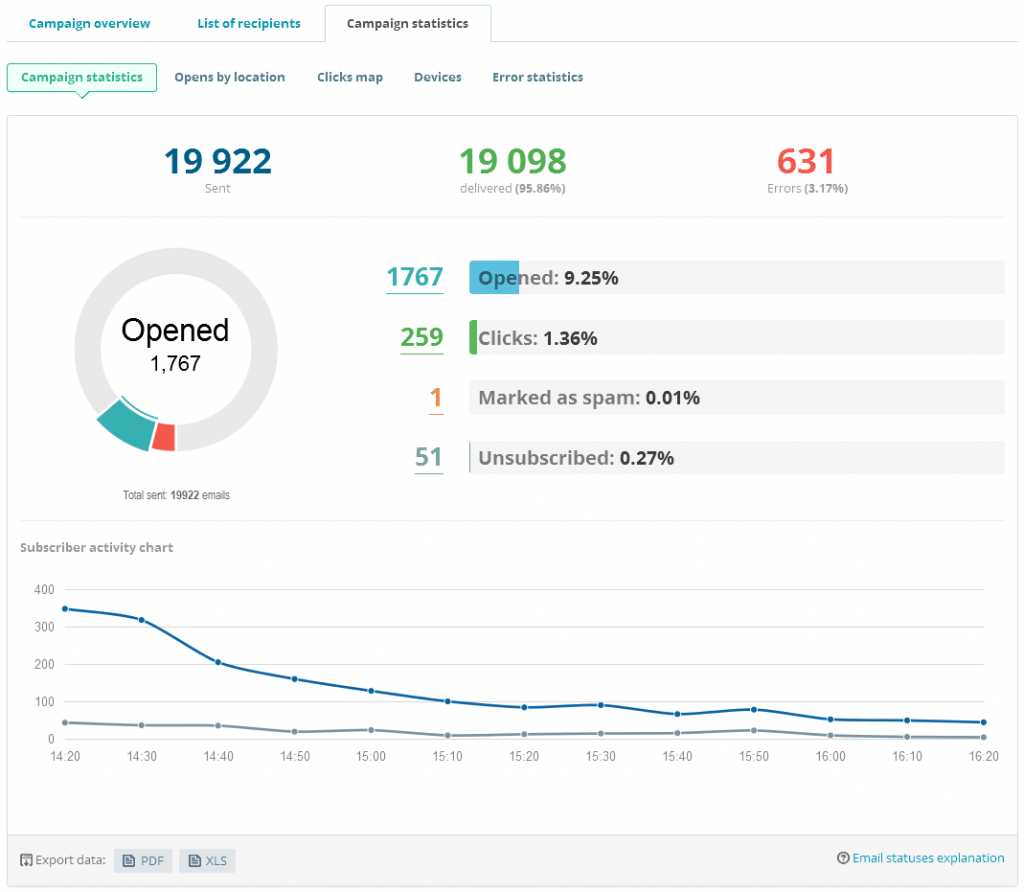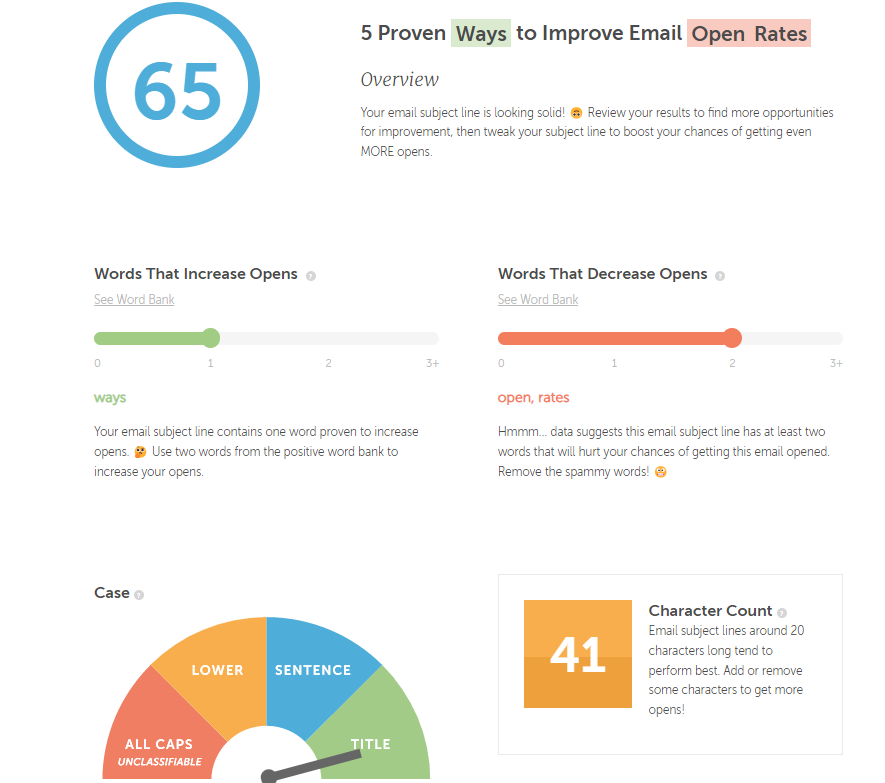5 proven ways to improve your email open rates

Open rates are a direct indicator of your email campaign’s success. Higher email open rates show that customers love your content (even if they don’t buy your products or services yet).
This is not the only metric that matters in email marketing, but it works in unison with other metrics — and it’s hard to improve unless you know what you’re doing.
According to Mailchimp, the average open rate across all industries is 21.33%.
That means fewer than three out of every ten emails get opened in most cases.
But that’s just an average percentage. Many brands top these numbers, while others succumb to even worse open rates. We’ll help you increase your open rate with proven tactics, but first, let’s check out some basics.
What Is an Email Open Rate?
An email open rate implies the percentage of subscribers who open your emails.
This rate tends to go down when subscribers see no value in opening your emails or when a technical glitch restricts your emails from landing in their inboxes. However, without maintaining a good open rate, you’ll face a drop in sales and email marketing revenue.
Let’s have a look at how this precious metric is calculated so we can improve it.

How to Calculate Your Email Open Rate
The math is pretty simple when it comes to calculating this metric. It doesn’t require any fancy additional tools beyond extracting some statistics from your email marketing software.
These two statistics are the number of emails you’ve delivered (E) and the number of emails opened by your recipients (O). Then, we apply the following formula:
▶️ Open Rate(%)=(O/E)*100
Keep in mind to extract the number of unique email openings. For instance, if a customer opens the same email twice or three times, it still counts as one opening.
Why Improve Your Open Rate?
The main reason to aim for a high open rate is that it translates into more business, but how does that happen?
Marketers tend to spend thousands of dollars on marketing campaigns. Without maximizing the open rates for emails, you’re losing more than you’re making. The line between the two is pretty thin, and open rates make all the difference.
When we look at the broad spectrum of events affected by email marketing open rates, we come to a fascinating understanding. High open rates mean more than sales. They also mean:
- A chance to convert highly interested prospects into clients,
- Your content is good, and you should maintain the same approach,
- Higher ROI that pays off the costs of your campaigns, and
- Improved brand awareness and trustworthiness.
However, such an important metric takes time and effort to improve. What if you keep trying, but nothing works? You keep refreshing that dashboard, but nothing changes! No worries; we’ve got some advice for you.

How to Improve Your Open Rate
There’s no magic code you can input to skyrocket those open rates. Actually, you only need to do one basic task: learn how to write a professional email that gets opened. Once you figure out the ideal emails for your business, keep replicating the same strategy.
It sounds like a cliché, but the basics are powerful. Never ignore the fundamentals until you’ve exhausted them to the maximum. You can achieve a higher open rate if you:
1. Know Your Audience Better
How well do you know your audience? If your open rates are low, you should aim to know them better. No one opens an email they’re not interested in. Dig deeper into their interests and find what’s missing in your emails.
How can you learn more about your audience? Well, ask them, but be careful of appearing intrusive. To find out why they joined your email list in the first place and what they expect from you, try these tactics:
- Send short surveys with no more than three questions.
- Track down the links that get clicked the most in your emails.
- Send short polls with just one question.
2. Find the Perfect Timing
Are you sending emails when customers are busy? They can be highly interested in your content, but if you email them during the wrong hours, customers won’t open them because they just can’t.
Your emails will slowly get pushed down into their inboxes throughout the day, and you’ve lost the chance to reach them. Test different sending times until you discover what works best.
3. Test Well-Aimed Subject Lines
Subject lines pretty much determine the fate of your emails. Generic and dull subject lines aren’t going to work. The best way to find what works is through testing. What works for other industries might not work for you, so you have to keep testing.
Experiment with your tone of voice, add emojis and numbers, and even tweak the length to see what works. Humor is also an important element that makes your emails entertaining and enjoyable to read.
Use tools like subject line tester to strengthen your subject lines. For instance, let’s take the title of this article and use it as a subject line. As you can see, there’s room for improvement.

4. Avoid the Spam Folder
The dreadful spam folder is like a virtual prison for your emails. However, you can avoid it with the right tactics. Emails end up in the spam folder when they appear to contain spammy elements such as dominating imagery or constant use of sales language. They can also end up in spam if you send mass emails without warming up your email list.
Follow the rules for permission-based email marketing practices to increase the chances of landing in your subscribers’ primary inboxes. These rules include sending emails from trusted accounts, sending high-quality emails, and implementing a double opt-in.
5. Use the Right Tools
Marketers are not programmers. If you’re using email marketing software you don’t fully understand how to operate, pushing the wrong buttons can get your emails sent at the wrong time or not sent at all. Choose simple tools such as Mailshake, GMass, or Mailbird.
Good email marketing tools provide all the essential features and functionalities you need to connect with your email list regularly. They should provide you with analytics that are easy to understand and allow you to send an email without much effort. Also, these tools should allow you to format your content and scrub your email list properly.
Conclusion
Your email open rate deserves your undivided attention. It’s a metric that shows how effective your campaigns are in building relationships with your customers and what you should improve in your emails. If the open rate is low, this is a sign you need to start testing new email strategies.
Four of the main points worth emphasizing are the sending time, subject lines, email marketing tools, and requirements to avoid the spam folder. Tweak and test these elements until you find out what yields the best results. The magic is in the testing.

